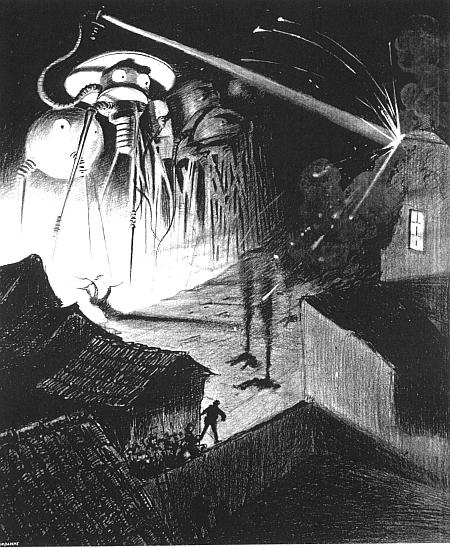Join The Army: See New Places! Shoot New Species!
I recently had the misfortune of watching a little movie called Battle: Los Angeles. It came out in March of 2011, perhaps you saw it too. It's an alien invasion movie focusing on the Marines who are just a small piece of the action. There's plenty to complain about regarding the hackneyed script and characters. The retirony. The dakka. The shaky cam. Oh, God, the shaky cam.
But as the closing credits went up, I was thinking about something else.
Around the release of Tranformers: Revenge of the Fallen, Kristin Thompson posted this blog entry about movies getting financial and technical assistance from the U.S. military. It's not new, and there's many reasons for doing it. The military of course wants some measure of script approval- Thompson says the Pentagon will insist on depicting teamwork as bringing success, rather than a lone hero's individual heroics.
Transformers is unique in getting material and people from four out of five service branches, where most focus on only one. Battle: LA, which focuses on a squad of heavily armed Marines got plenty of assistance from, you guessed it, the Coast Guard. But it doesn't stop there.
 Battle: Los Angeles is essentially a two hour recruiting commercial.[ref] Of Transformers, one Army official says in Variety, if the military had to fend off an alien invasion, "this is how we'd do it." Yet at the beginning of Battle:LA, when the humans still have air superiority, they let the Marines walk through Santa Monica, so by the time they get to their destination, the aliens have the upper hand and they have to walk all the way back.[/ref] You think I'm kidding. The focus on teamwork is ever present. One character makes a heroic sacrifice by screaming his name, rank, and unit over the radio. The surviving characters make it to safety and a hot meal, only to grab more ammo to return to the fray.
Battle: Los Angeles is essentially a two hour recruiting commercial.[ref] Of Transformers, one Army official says in Variety, if the military had to fend off an alien invasion, "this is how we'd do it." Yet at the beginning of Battle:LA, when the humans still have air superiority, they let the Marines walk through Santa Monica, so by the time they get to their destination, the aliens have the upper hand and they have to walk all the way back.[/ref] You think I'm kidding. The focus on teamwork is ever present. One character makes a heroic sacrifice by screaming his name, rank, and unit over the radio. The surviving characters make it to safety and a hot meal, only to grab more ammo to return to the fray.
The best example is the three children are rescued by the Marines- two girls and a boy. The girls are ignored, except when they scream in terror. The boy, on the other hand gets some minor heroics and is dubbed "the bravest Marine I've ever met." Three guesses what he wants to be when he grows up.
The multitudes will undoubtedly walk out feeling mildly more patriotic[ref] Since when did being patriotic come to mean fawning over the military?[/ref], but perhaps unaware that this movie owes a lot to a story with a very different purpose.
Battle: LA, like most alien invasion stories, takes much of its premise to The War of the Worlds, a novel written way back in 1898 by H.G. Wells. Here, the mighty British Empire is conquered by Martians who are to us as we are to microbes in a drop of water. And what saves the day in the end? The microbes, the lowest forms of life on Earth, against whom the invaders have no defenses.[ref] Oddly, Wells' heroic germs have, in practice, tended to work in the invaders' favor. [/ref]
Wells goes a step further, suggesting that the mighty British Empire and the Martians  may not be so different: "And before we judge them [the Martians] too harshly, we must remember what ruthless and utter destruction our own species has wrought... Are we such apostles of mercy as to complain if the Martians warred in the same spirit?"[ref] From Chapter 1, "The Eve of the War."[/ref] Only in science fiction would the British Empire get a taste of its own medicine.
may not be so different: "And before we judge them [the Martians] too harshly, we must remember what ruthless and utter destruction our own species has wrought... Are we such apostles of mercy as to complain if the Martians warred in the same spirit?"[ref] From Chapter 1, "The Eve of the War."[/ref] Only in science fiction would the British Empire get a taste of its own medicine.
H.G. Wells, it should be noted, was a Socialist[ref] It's a vague term, and can mean lots of things. Wells was a fan of a one-world-government, collective ownership and not a fan of capitalism. The distinction between Socialism and Communism is also blurry, but he probably wouldn't go that far.[/ref], as in, "actually believes in Socialism," and not a Socialist, as in, "centrist Democrat," like Barack Obama. Wells is interested not just in new technologies, but in the ways they affect society.[ref] Wells' The Time Machine features a future society where the aristocracy have evolved into the innocent, childlike Eloi. The working class, after centuries of toiling underground, has evolved into the subterranean Morlocks who feast upon the rich. In case you're wondering, yes, that is class warfare. A spectre is haunting Europe, indeed...[/ref] The point is not that aliens are invading Earth and that's cool, it's that the aliens are doing just what we've done to ourselves.
So you can imagine I was a little upset when I saw Wells' critique of military might and plea for self-reflection distorted into a popcorn propaganda movie.
But perhaps I complain too much. Wells himself was indebted to a genre of stories called "invasion literature," featuring Britain invaded by some foreign power, usually Germany. They were quite popular up until about 1914, when WWI made modern warfare not so fun anymore. As vehicles for nationalistic heroics, they served basically the same purpose as Battle:LA does today.
While H.G. Wells made his Britain uniquely helpless against the invaders, the director Jonathan Liebesman and his cohorts have ignored what Wells was trying to do. Instead they have made a piece of mindless propaganda that encourages the infinite complacency with which men go "to and fro over this globe, about their little affairs, serene in their assurance of their empire over matter."
I should point out that I have nothing against the U.S. military[ref] Rah rah rah![/ref], and if they ever wish to give me their assistance, I will gladly take it.
